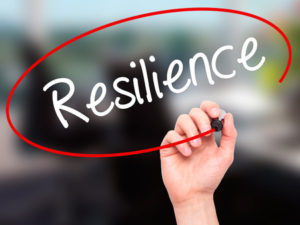The Leadership Gift of Resilience
“A person who falls and gets back up
is much stronger than a person who never falls.”
 The focus of this month’s social media series are 3 Leadership gifts – solitude, resilience, and hope. Previously we unwrapped the gift of solitude. Now, we are ready to discover what the gift of resilience holds for us as leaders.
The focus of this month’s social media series are 3 Leadership gifts – solitude, resilience, and hope. Previously we unwrapped the gift of solitude. Now, we are ready to discover what the gift of resilience holds for us as leaders.
In August, the International Coach Federation held its Conference in DC. I found myself drawn to a session about resilience in coaching. As the session evolved, what I realized was here was a second leadership gift to go with the gift of solitude. That gift is resilience.
What is Resilience?
While resilience means different things to different people, the definition offered was this:
“Resilience is one’s ability to remain flexible in our thoughts feelings, and behaviors when faced by a disruption or extended periods of pressure, so that we emerge from difficulty stronger, wiser, and more able.”
Pemberton: Resilience (McGraw Hill, 2015).
Briefly, it’s one’s ability to remain standing. Because resilience is an outcome rather than a thing, it originates from the combination of three things – genetics, childhood experiences, and learning from adversity. No more than 30% is genetics based. Childhood factors include things such as deprivation, the degree to which a child feels safe, whether the child had an adult he/she could count on, etc. Learning from adversity is the greatest influencer of one’s resilience. It’s almost like growing a muscle and the good news is that resilience tends to increase as we get older.
How You Know When Resilience is Low
Indicators that my resilience could be declining may include:
- A sudden attitude of pessimism
- A loss of connection with the purpose of my work or life
- Withdrawal from relationships
- Outbursts of emotion
- Difficulty focusing
- Loss of confidence
- Changes in my eating or drinking patterns
- Sleep habits change
- I discontinue doing what I enjoy
- It’s hard to make decisions
Three Things to do to Increase Resilience
- Recycle – What are the knowledge and skills that you usually rely on? Reconnect to your strengths such as compartmentalizing things, using humor, listening to music, meditating, reading, poetry, etc. Re-activate them!
- Resource – What resources do you have access to . . . including both human and material resources? Maybe it’s accessing a thinking partner such as a coach, studying your strengths, learning something new, or actively building confidence in self.
- Re-Author – How might we rewrite our story? Perhaps we create a new beginning or ending, or we rewrite the narrative around the event or situation that has occurred, or we assign different powers to the players in the narrative. When we can create a different relationship with the event, we can recover more quickly. A study of widowed men vs. widowed women showed that women moved faster because they talked about the experience and expressed their emotions aloud to one another.
Because leadership is far from an act of perfection, we have many opportunities to build the muscle of resilience. By combining the first two gifts – solitude and resilience – we can remain strong in the presence of everyday challenges.
How resilient are you? How do you know?
Reference: Pemberton, C (2017) Resilience Coaching: Rebuilding Resilience When It’s A Crash, Not A Wobble. International Coach Federation Conference. Washington, DC.